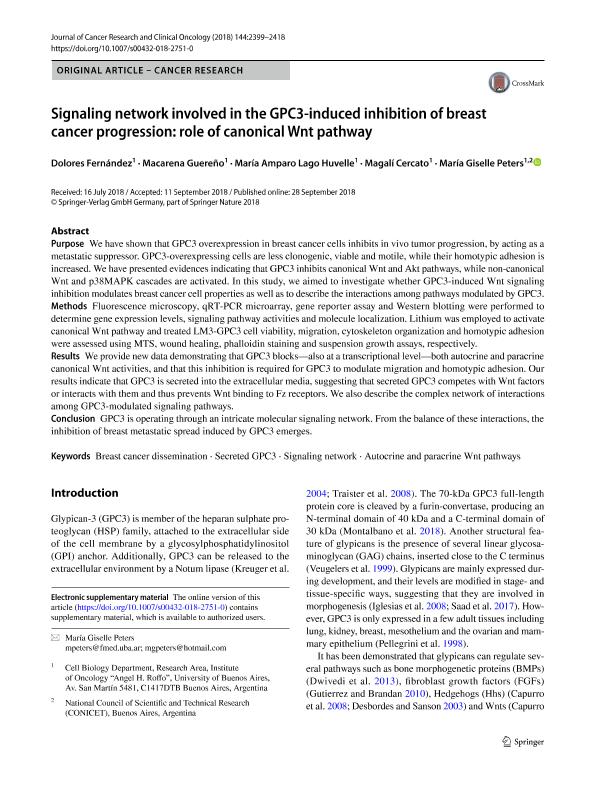Artículo
Signaling network involved in the GPC3-induced inhibition of breast cancer progression: role of canonical Wnt pathway
Fernández, Dolores; Guereño, Macarena; Lago Huvelle, María Amparo ; Cercato, Magalí Cecilia
; Cercato, Magalí Cecilia ; Peters, María Giselle
; Peters, María Giselle
 ; Cercato, Magalí Cecilia
; Cercato, Magalí Cecilia ; Peters, María Giselle
; Peters, María Giselle
Fecha de publicación:
09/2018
Editorial:
Springer
Revista:
Journal Of Cancer Research And Clinical Oncology
ISSN:
0171-5216
Idioma:
Inglés
Tipo de recurso:
Artículo publicado
Clasificación temática:
Resumen
Purpose: We have shown that GPC3 overexpression in breast cancer cells inhibits in vivo tumor progression, by acting as a metastatic suppressor. GPC3-overexpressing cells are less clonogenic, viable and motile, while their homotypic adhesion is increased. We have presented evidences indicating that GPC3 inhibits canonical Wnt and Akt pathways, while non-canonical Wnt and p38MAPK cascades are activated. In this study, we aimed to investigate whether GPC3-induced Wnt signaling inhibition modulates breast cancer cell properties as well as to describe the interactions among pathways modulated by GPC3. Methods: Fluorescence microscopy, qRT-PCR microarray, gene reporter assay and Western blotting were performed to determine gene expression levels, signaling pathway activities and molecule localization. Lithium was employed to activate canonical Wnt pathway and treated LM3-GPC3 cell viability, migration, cytoskeleton organization and homotypic adhesion were assessed using MTS, wound healing, phalloidin staining and suspension growth assays, respectively. Results: We provide new data demonstrating that GPC3 blocks—also at a transcriptional level—both autocrine and paracrine canonical Wnt activities, and that this inhibition is required for GPC3 to modulate migration and homotypic adhesion. Our results indicate that GPC3 is secreted into the extracellular media, suggesting that secreted GPC3 competes with Wnt factors or interacts with them and thus prevents Wnt binding to Fz receptors. We also describe the complex network of interactions among GPC3-modulated signaling pathways. Conclusion: GPC3 is operating through an intricate molecular signaling network. From the balance of these interactions, the inhibition of breast metastatic spread induced by GPC3 emerges.
Archivos asociados
Licencia
Identificadores
Colecciones
Articulos(IQUIFIB)
Articulos de INST.DE QUIMICA Y FISICO-QUIMICA BIOLOGICAS "PROF. ALEJANDRO C. PALADINI"
Articulos de INST.DE QUIMICA Y FISICO-QUIMICA BIOLOGICAS "PROF. ALEJANDRO C. PALADINI"
Articulos(OCA HOUSSAY)
Articulos de OFICINA DE COORDINACION ADMINISTRATIVA HOUSSAY
Articulos de OFICINA DE COORDINACION ADMINISTRATIVA HOUSSAY
Citación
Fernández, Dolores; Guereño, Macarena; Lago Huvelle, María Amparo; Cercato, Magalí Cecilia; Peters, María Giselle; Signaling network involved in the GPC3-induced inhibition of breast cancer progression: role of canonical Wnt pathway; Springer; Journal Of Cancer Research And Clinical Oncology; 144; 12; 9-2018; 2399-2418
Compartir
Altmétricas



